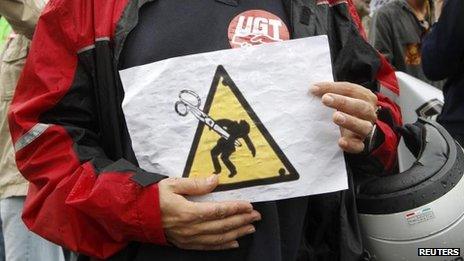Clock ticks on Spain bailout
- Published
- comments

From Spain to Greece, Italy and beyond, frustration and anger over austerity is increasingly palpable on the streets
We are in familiar territory. A eurozone country is assessed as on the verge of a bailout and the countdown begins. International markets are unsettled by the uncertainty over Spain.
What do we know? Brussels is onside to manage the eurozone's fourth full-blown bailout if it is requested. The EU's Economics Commissioner Olli Rehn has declared that Europe's leaders are ready to act.
Spain itself is unsure. The prime minister is ready to request help if the borrowing costs "stay high for too long".
The sticking point is conditions. Madrid is not willing to accept further austerity measures imposed by the EU and IMF. That was at the heart of the talks yesterday.
The Spanish government is seeking assurances that if it requests a rescue then last week's budget will suffice. The view in Brussels is that Spain has done enough.
The leaders of France and Italy are in favour of Spain asking for help. They believe it will calm the markets and remove one more uncertainty. But as I mentioned last week, Germany is far less sanguine about another bailout. It cannot be certain that the Bundestag would sign off on another rescue.
Two other factors are at play. In August the president of the European Central Bank, Mario Draghi, said that he would support countries like Spain by buying their debt - but only if they requested a rescue first, with conditions.
So, the argument goes, why would Spain pass up on this when it needs to raise 38bn euros (拢30bn; $49bn) next year to service its debt? Mr Draghi essentially offers to make that task cheaper.
What may bring this to a rapid conclusion? In a word: Moody's. The credit ratings agency may downgrade Spain to junk status. If that happens its borrowing costs will spike and that might be the trigger for a bailout. That could all happen before a meeting of eurozone finance ministers next week.
'Social meltdown'
Even if that happens, the crisis does not go away. Increasingly the eye of the storm is what is happening in the real economies and in people's lives.
The figures coming out of Greece yesterday were shocking. The economy will contract by nearly 4% next year - that's the sixth year of recession. Unemployment is set to go up to 24.7%. Its public debt will reach 346bn euros.
In the eurozone as a whole unemployment has reached 11.4%. A historian, Felipe Fernandez-Armesto, writing in The Times, says that: "Fears of a social meltdown are excessive but not baseless."
From the streets of Athens, to Madrid, to Lisbon, to Paris, to Rome you can sense the frustration growing. The future of the eurozone may not be determined by summits but by the people who might, in the end, reject austerity as the price of supporting the single currency.